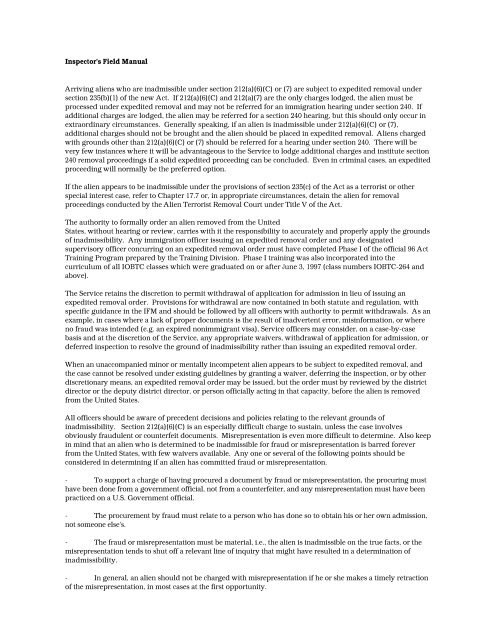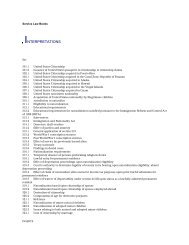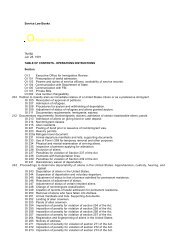Create successful ePaper yourself
Turn your PDF publications into a flip-book with our unique Google optimized e-Paper software.
<strong>Inspector's</strong> <strong>Field</strong> <strong>Manual</strong><br />
Arriving aliens who are inadmissible under section 212(a)(6)(C) or (7) are subject to expedited removal under<br />
section 235(b)(1) of the new Act. If 212(a)(6)(C) and 212(a)(7) are the only charges lodged, the alien must be<br />
processed under expedited removal and may not be referred for an immigration hearing under section 240. If<br />
additional charges are lodged, the alien may be referred for a section 240 hearing, but this should only occur in<br />
extraordinary circumstances. Generally speaking, if an alien is inadmissible under 212(a)(6)(C) or (7),<br />
additional charges should not be brought and the alien should be placed in expedited removal. Aliens charged<br />
with grounds other than 212(a)(6)(C) or (7) should be referred for a hearing under section 240. There will be<br />
very few instances where it will be advantageous to the Service to lodge additional charges and institute section<br />
240 removal proceedings if a solid expedited proceeding can be concluded. Even in criminal cases, an expedited<br />
proceeding will normally be the preferred option.<br />
If the alien appears to be inadmissible under the provisions of section 235(c) of the Act as a terrorist or other<br />
special interest case, refer to Chapter 17.7 or, in appropriate circumstances, detain the alien for removal<br />
proceedings conducted by the Alien Terrorist Removal Court under Title V of the Act.<br />
The authority to formally order an alien removed from the United<br />
States, without hearing or review, carries with it the responsibility to accurately and properly apply the grounds<br />
of inadmissibility. Any immigration officer issuing an expedited removal order and any designated<br />
supervisory officer concurring on an expedited removal order must have completed Phase I of the official 96 Act<br />
Training Program prepared by the Training Division. Phase I training was also incorporated into the<br />
curriculum of all IOBTC classes which were graduated on or after June 3, 1997 (class numbers IOBTC-264 and<br />
above).<br />
The Service retains the discretion to permit withdrawal of application for admission in lieu of issuing an<br />
expedited removal order. Provisions for withdrawal are now contained in both statute and regulation, with<br />
specific guidance in the IFM and should be followed by all officers with authority to permit withdrawals. As an<br />
example, in cases where a lack of proper documents is the result of inadvertent error, misinformation, or where<br />
no fraud was intended (e.g. an expired nonimmigrant visa), Service officers may consider, on a case-by-case<br />
basis and at the discretion of the Service, any appropriate waivers, withdrawal of application for admission, or<br />
deferred inspection to resolve the ground of inadmissibility rather than issuing an expedited removal order.<br />
When an unaccompanied minor or mentally incompetent alien appears to be subject to expedited removal, and<br />
the case cannot be resolved under existing guidelines by granting a waiver, deferring the inspection, or by other<br />
discretionary means, an expedited removal order may be issued, but the order must by reviewed by the district<br />
director or the deputy district director, or person officially acting in that capacity, before the alien is removed<br />
from the United States.<br />
All officers should be aware of precedent decisions and policies relating to the relevant grounds of<br />
inadmissibility. Section 212(a)(6)(C) is an especially difficult charge to sustain, unless the case involves<br />
obviously fraudulent or counterfeit documents. Misrepresentation is even more difficult to determine. Also keep<br />
in mind that an alien who is determined to be inadmissible for fraud or misrepresentation is barred forever<br />
from the United States, with few waivers available. Any one or several of the following points should be<br />
considered in determining if an alien has committed fraud or misrepresentation.<br />
- To support a charge of having procured a document by fraud or misrepresentation, the procuring must<br />
have been done from a government official, not from a counterfeiter, and any misrepresentation must have been<br />
practiced on a U.S. Government official.<br />
- The procurement by fraud must relate to a person who has done so to obtain his or her own admission,<br />
not someone else's.<br />
- The fraud or misrepresentation must be material, i.e., the alien is inadmissible on the true facts, or the<br />
misrepresentation tends to shut off a relevant line of inquiry that might have resulted in a determination of<br />
inadmissibility.<br />
- In general, an alien should not be charged with misrepresentation if he or she makes a timely retraction<br />
of the misrepresentation, in most cases at the first opportunity.




